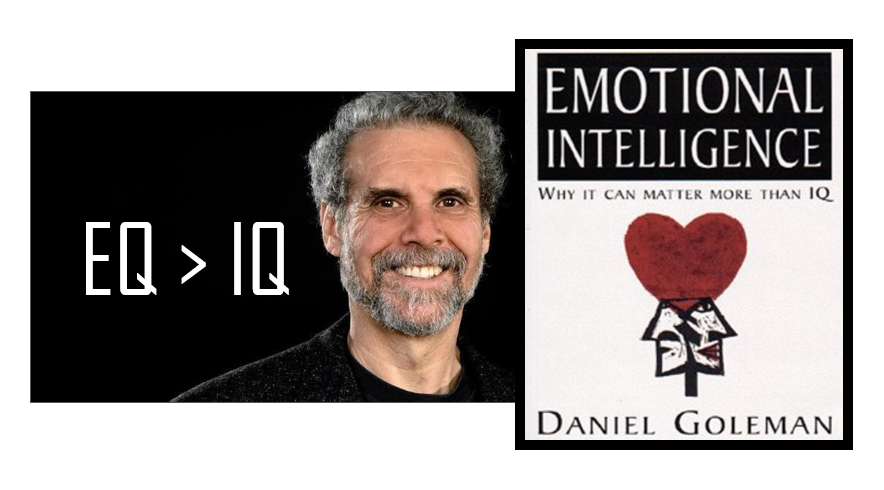
You might be the topper in exams, but your life might be going on a roller-coaster ride with turbulent emotions dominating your mind. Do you know what you really desire? Or your anxiety and enthusiasm throws you into uncomfortable situations? May be you lack the capability to motivate yourself at the tiniest failure, and you have trouble resonating with other people and even respect, if not understand their point of view? Do you lack the confidence and skills to build a rapport or assertiveness while communicating? Then the book ‘Emotional Intelligence: Why it can matter more than IQ’ is the perfect book for you, explaining why some, despite having a high IQ flounder and some are surprisingly well in life, career, relationships and business even with an average IQ.
CORE OF THE BOOK
Emotional Intelligence is the ability to notice and hence regulate our emotions and to use that ability to be more effective. Emotional Quotient, or EQ, is dependent upon the effective regulation of emotions and the book provides plenty of case studies and scientifically backed facts to explain the dynamics of our mind.
BRIEF BREAKDOWN
Part-1: Discoveries about the brain’s emotional architecture explain the baffling moments when feeling overwhelms all rationality, and rules our moments of rage and fear – passion and joy reveals much about how we learn the emotional habits that can undermine our best intentions, and what we can do to subdue our most destructive or self-defeating emotional impulses.
Part-2: Explores the aspects of being self-aware about our desires and ambitions and self-regulation of impulses and urges, some of which could be detrimental to our image and life.
Part-3: Explores the relationship circuit and the latent determiners of maintaining a healthy and successful relationship, throwing a new light into the core of marital problems.
Part-4: Explores how early education and environment can have a lasting impact on people and despite all the changes in culture later in life, some biases and stereotypes remain with them and in some cases, become reasons for mental health issues. This part also suggests remedies for analysing and countering such issues.
Part-5: Explores the detrimental effects of the lack of emotional intelligence while growing up and how it exacerbates a myriad of risks, from depression, a life of violence and drug abuse.
UNIQUE ASPECTS
Some things that put the book apart from the self-help books roaming the market are:
1. It provides a new, healthy and the best perspective there is to improve ourselves.
2. Intricately constructive amalgamation of science and practical findings are presented in a lucid manner easy to understand by a layman.
It isn’t another self-help book like those of Dale Carnegie, Napoleon Hill or even present self-help gurus like Mark Manson. In fact, Goleman brings forward a more generalised and precise understanding of the ways humans behave and why they behave, the understanding of which has been upped by the scientific and technological advances in studying the brain and neuroscience. The answers are sure to awe you and provide you with valuable advice to rectify your situation. It is the father of all self-help gurus.
REVIEWER’S VIEWS
I never thought that there is even a thing like “intelligent emotions”-so, even some emotional intelligence that I didn’t know could be more important than IQ is really a curious pick for me.
This book really changed the way I have begun to manage my emotions and hence, life overall. Goleman’s concepts and consultancies have been sought by a lot of organisations and companies for training and upgrading the quality of their employees. Emotional training has even become a significant part of business schools, companies, and Union Public Service recruitments.
In Goleman’s own words: “For star performance… emotional competence is twice as important as purely cognitive abilities.”
ABOUT DANIEL GOLEMAN
Daniel Goleman was born on 7th March 1946. The author and science journalist previously wrote for The New York Times on the brain and behavioural sciences. His 1995 book Emotional Intelligence was on The New York Times Best Seller list for more than a year, a best-seller in many countries, and is in print worldwide in 40 languages. Apart from his books on emotional intelligence, Goleman has written books on topics including self-deception, creativity, transparency, meditation, social and emotional learning, ecoliteracy and the ecological crisis including Dalai Lama’s vision for the future. He has won numerous awards including the Career Achievement Award for Excellence in the Media in 1984.
OTHER BOOKS BY GOLEMAN
• 1977: The Varieties of the Meditative Experience Republished in 1988 as The Meditative Mind: The Varieties of Meditative Experience
• 1995: Emotional Intelligence: Why It Can Matter More Than IQ
• 1998: Working with Emotional Intelligence
• 2001: Primal Leadership: Unleashing the Power of Emotional Intelligence, with Richard Boyatzis and Annie McKee
• 2006: Social Intelligence: Beyond IQ, Beyond Emotional Intelligence
• 2013: Focus: The Hidden Driver of Excellence
• 2015: A Force for Good: The Dalai Lama’s Vision for Our World
• 2017: Altered Traits: Science Reveals How Meditation Changes Your Mind, Brain, and Body, with Richard Davidson
• 2019: The Emotionally Intelligent Leader
ABOUT THE REVIEWER
Deep Pathak was born in 2000 in Guwahati, India. Deep ranked 14th all over India in the CITDEE engineering entrance exam in 2019. Deep is an incrementalist and learns by undertaking ambitious self-challenging projects. Criticisms and rejections are his metaphorical shadows and so are his ambition and persistent effort. He is a voracious reader and writer of various subjects and has won recognition in international essay competition; a firm devotee of the enlightenment; and believes in the potential of constructive amalgamation of science and arts to increase the scientific knowledge base and start new areas of research. Culture matters a lot for him and he is the most efficient in a calm and serene environment. Deep wants to light sustainable and the brightest torches of enlightenment: the case for reason, science, humanism and progress.


